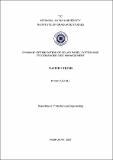Please use this identifier to cite or link to this item:
http://hdl.handle.net/11547/11488| Title: | DYNAMIC OPTIMIZATION OF SOLAR PANEL SYSTEM AND ITS DEMANDED SIDE MANAGEMENT |
| Authors: | ALI, Khodr HAJ |
| Issue Date: | 2024 |
| Publisher: | İSTANBUL AYDIN ÜNİVERSİTESİ SOSYAL BİLİMLER ENSTİTÜSÜ |
| Abstract: | Turkey has increasingly turned its attention towards solar renewable energy as a pivotal component of its sustainable future. The country's abundant sunlight resources and growing energy demands have paved the way for significant investments in solar power projects. With a strategic focus on reducing dependence on fossil fuels, promoting environmental well-being, and achieving energy security, Turkey's solar renewable energy sector is rapidly evolving. This shift not only aligns with global clean energy goals but also contributes to Turkey's economic growth while mitigating the environmental impact of traditional energy sources. The adoption of solar panel systems is gaining momentum worldwide due to their remarkable significance in sustainable energy solutions. Integrating solar panel systems holds the potential to greatly reduce reliance on fossil fuels, curb greenhouse gas emissions, and pave the way for a greener future. By harnessing the abundant and renewable energy of the sun, these systems contribute to energy independence, cost savings, and environmental preservation. Beyond the immediate economic benefits, embracing solar panel systems showcases a commitment to responsible energy consumption and addresses the pressing global challenge of climate change. As individuals, businesses, and communities seek to embrace cleaner and more efficient energy alternatives, the application of solar panel systems emerges as a pivotal step towards creating a cleaner and more resilient energy future. The primary goal of this study was to enhance the efficient utilization of solar radiation captured by the solar panels integrated into Istanbul Aydin University's solar energy framework. The research aimed to determine the most advantageous tilt angle for these panels, accounting for different time periods such as hourly, seasonal, and semi-annual performance intervals. To achieve this, the study utilized the Photovoltaic Geographical Information System (PVGIS) to evaluate solar radiation exposure and implemented PVGIS methodology to identify the optimal angles at which the panels should be inclined. This project further expands on these efforts by focusing on the dynamic optimization of solar panel systems. By analyzing the performance of a movable solar panel, oriented towards six horizontal directions and moving between five pre-defined angles, the project aims to understand the optimal directions and angles for solar energy absorption throughout each hour. The steps involve panel movement, data collection, comparison with current solar panels that is already been implemented in Isantbul Aydin University, and results analysis, contributing valuable insights to harness solar energy more effectively. |
| URI: | http://hdl.handle.net/11547/11488 |
| Appears in Collections: | Tezler -- Thesis |
Files in This Item:
| File | Description | Size | Format | |
|---|---|---|---|---|
| 10627420.pdf | 1.23 MB | Adobe PDF |  View/Open |
Items in DSpace are protected by copyright, with all rights reserved, unless otherwise indicated.
